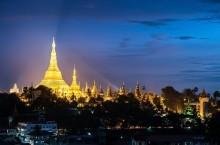City of Myanmar County (Yangon)
Myanmar is one of the mysterious country in South East Asia and because of its cultural and geographical diversity has retained much of its historic and unique character. Discover the great attractions in Myanmar and the country's wonderful uniqueness.
Yangon is a big and yet not modernized city, with Victorian buildings, tree-lined avenues, lakes and parks and a bustling city centre of friendly vendors, colourful stalls and people going about in their daily chores dressed traditionally in their Longyi and flip-flap sandals. The Bogyoke Aung San market (also called Scott’s Market) is a must for every visitor and so is the magnificent Shwedagon Pagoda – the prominent landmark of Myanmar. The first fundament of the Shwedagon is believed to have been built more than 2000 years ago, and the pagoda is revered by Buddhist and non-Buddhists alike. Yangon is the gateway to Myanmar and has direct air links with Bangkok, Singapore, Kuala Lumpur, Tokyo, Seoul, Doha, Beijing, Hanoi, Ho Chi Minh City, Chiang Mai, Hong Kong, Taipei, Guangzhou, Kunming, Nanning, Gaya and Dhaka.
Yangon is a city of 5 million people, but the downtown area is relatively small and can easily be covered on foot. A morning stroll with your guide through Yangon’s colonial architecture to the Strand Hotel, once one of the most renowned hotels in Asia in line with the Oriental in Bangkok, Raffels in Singapore and the Peninsula in Hong Kong and during the last fifteen years restored to some of its former glory. At the Bogyoke Aung San market you will find everything of locally produced items, from Mandalay silk, ethnic minority products, silver and wood carvings to precious stones, garments and cheroots. In the heart of the city is the Sule Pagoda, the nucleus from where the city centre where were laid out in its Victorian grid pattern by the British about 150 years ago. Even if it is a predominantly Buddhist community, Yangon is still home to many other faiths, and strolling about you will see Hindu and Chinese temples, Islamic mosques, Anglican cathedrals and various Christian churches. There is even a small Jewish synagogue.
While Yangon until the 18th century was still an insignificant fishing village, its prominent and famous landmark, the Shwedagon Pagoda has stood there for more than 1000 years, mesmerizing visitors and residents alike with its glistening gold covered stupa where it is said that eight hairs of the last (Gautama) Buddha are enshrined at the base. The tip of the stupa is covered with 1800 carats gold and studded with thousands of diamonds, rubies, sapphires and topaz. A huge emerald sits in the middle to catch the first and last rays of the sun. You should go there in the late afternoon before sunset, remove you shoes and slowly wander the lower terraces together with the friendly local population of very devout Buddhists.
